Address
304 North Cardinal St.
Dorchester Center, MA 02124
Work Hours
Monday to Friday: 7AM - 7PM
Weekend: 10AM - 5PM
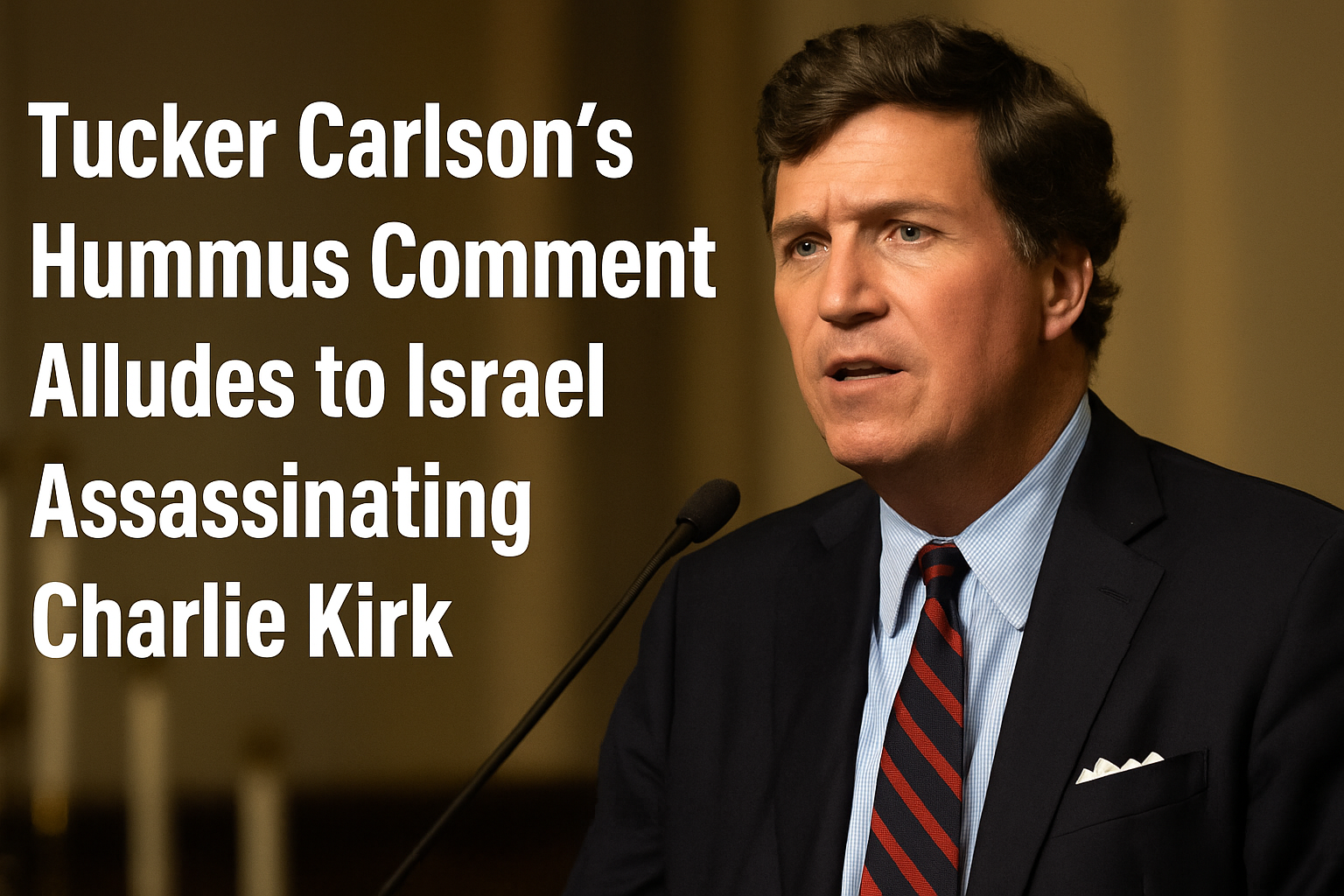
At Charlie Kirk’s funeral, Tucker Carlson delivered a parable that instantly exploded beyond the stadium’s walls. Evoking “2,000 years ago in Jerusalem,” he described a lamp-lit room where men “sitting around eating hummus” decided to silence Jesus by killing him. Carlson’s allegory was framed as a lesson about truth-tellers who pay the ultimate price — but in the charged climate of Kirk’s assassination, it was heard as something more: a dogwhistle alluding to Israel assassinating Charlie Kirk.
The timing couldn’t have been more volatile. Kirk himself had become a flashpoint in the conservative movement’s growing fracture over Israel. Once reliably aligned with pro-Israel donors and messaging, he had lately expressed frustration at how questions about Israel overshadowed his broader vision of “America First.” Carlson, by contrast, had already made his break, carving out space for open skepticism of U.S. support for Israel. The “hummus comment” therefore landed not only as a provocative metaphor but as a marker of a deeper ideological divide reshaping the right in real time.
Carlson began his eulogy with what he called his “favorite story,” setting it in Jerusalem two millennia ago. In his telling, Jesus angered the powerful by “doing the worst thing you can do, which is telling the truth about people.” The elites, he said, became obsessed with shutting him down.
“I can just sort of picture the scene,” Carlson continued, “in a lamp lit room with a bunch of guys sitting around eating hummus thinking about what do we do about this guy telling the truth about us? We must make him stop talking. And there’s always one guy with the bright idea. And I could just hear him say, ‘I’ve got an idea. Why don’t we just kill him? That’ll shut him up.’”
On its face, the parable drew a line between Kirk and Jesus — truth-tellers silenced by assassination. Carlson added the moral: “It doesn’t work that way.” But the imagery of “Jerusalem” and “hummus,” deployed at a memorial already shadowed by speculation about Israel, ensured the remark carried more than biblical resonance. It became a coded moment — an allegory wrapped in cultural shorthand — that his audience could not miss. At the same time, and in line with the best practices of information warfare, the allusion is plausibly deniable, and very much in line with Carlson’s rhetorical style.
Charlie Kirk’s relationship with Israel was complicated, and in the months leading up to his death it had become a visible source of tension. As founder of Turning Point USA, he had long been a dependable ally to pro-Israel causes, often aligning with hawkish donors and campus initiatives that stressed solidarity with the Jewish state. For years, Kirk was invited to high-profile summits, praised for mobilizing young conservatives around issues central to Israel’s foreign policy interests.
But cracks were beginning to show. On his campus tours, Kirk frequently found himself fielding hostile questions about Israel — sometimes more questions on the subject than on any other political issue. Privately, he voiced frustration that his events were being hijacked by debates over Israel, when he wanted to emphasize his “America First” priorities. Reporting in the weeks before his death indicated he was uneasy about being boxed in as a single-issue figurehead, pressured by donors on one side and challenged by skeptical students on the other.
This tension placed Kirk squarely in the middle of the conservative movement’s growing schism. Younger grassroots conservatives, more isolationist and more openly critical of Israel, were pressing for answers that didn’t align with the Neo-Conservative old guard’s unwavering support. At the same time, leaders like Carlson had already broken with that consensus, openly questioning the U.S.–Israel relationship and positioning themselves as defenders of an “America First” ethos. Against this backdrop, Carlson’s hummus parable at Kirk’s funeral took on added significance: it wasn’t just a biblical metaphor, but a narrative marker in the unfolding realignment over Israel inside the American right.
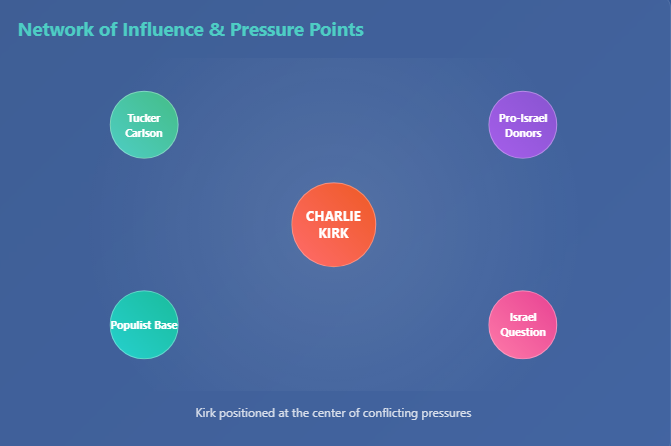
The “hummus comment” landed in a conservative movement already tearing itself apart over Israel. For decades, support for the Jewish state was nearly axiomatic among Republicans. Evangelical leaders, neoconservative policy hands, and major GOP donors insisted that unwavering alignment with Israel was not only geopolitically prudent but a moral imperative.
That consensus no longer holds. The rise of the populist “America First” right has exposed deep fissures. Younger conservatives and populist voices increasingly question whether U.S. policy toward Israel serves American interests, echoing broader skepticism about foreign entanglements. Campus activists — many of them the same demographics Kirk once sought to mobilize — now press conservative leaders with hard questions about Gaza, settlements, and aid.
Tucker Carlson embodies this realignment and the schism in the populist “American First” Movement. Long hostile to neoconservatism, he has used his platform to challenge traditional pro-Israel orthodoxy, framing it as part of a broader critique of U.S. foreign policy. Figures like Candace Owens have amplified similar arguments, accusing the donor class of enforcing loyalty tests on Israel. On the other side stand entrenched hawks and megadonors who still see pro-Israel advocacy as a litmus test for conservative credibility.
Kirk found himself caught in the middle of this rift. While his public messaging remained cautious, reports suggest he was under growing strain from both sides: donors demanding unwavering support, and grassroots conservatives demanding answers about Israel’s influence. Carlson, by contrast, had already chosen his side — and his hummus parable at Kirk’s memorial underscored just how far the debate has shifted.
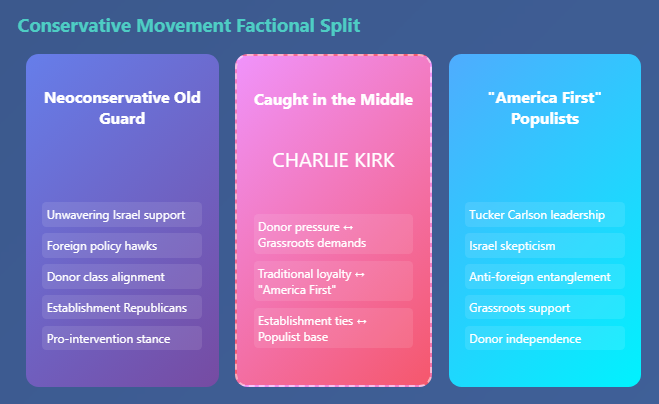
Carlson’s story was framed as history — men in Jerusalem conspiring against Jesus — but the details were chosen with surgical precision. He could have described faceless rulers, cloaked priests, or generic Roman officials. Instead, he conjured “a lamp lit room” and “a bunch of guys sitting around eating hummus.” That imagery was not accidental.
Hummus is not just a neutral food reference; it is a modern cultural marker of the Middle East, and particularly of Israel. Paired with Jerusalem, it functions as shorthand — a cue to listeners primed to see connections between Kirk’s assassination with a Mauser rifle and Israel’s role in contemporary politics. By rooting his parable in that imagery, Carlson guaranteed that audiences would interpret the allegory as a veiled comment on today, not merely a biblical anecdote.
This is classic Carlson. For years, he has used indirection and metaphor to imply far more than he states outright. The technique, a classical form of narrative shaping through information warfare, serves two functions: it sparks interpretation among sympathizers who “get the message,” and it gives Carlson deniability if challenged. The hummus comment operated exactly this way. Supporters could hear it as truth-teller allegory; critics immediately heard it as Israel dogwhistle. Either way, it achieved its purpose — making Israel part of the conversation around Kirk’s death without Carlson ever saying the word.
The effect was immediate. Within minutes of Carlson’s remarks, “hummus” trended on X alongside “Tucker” and “Israel.” Clips of the line, ripped from livestreams and phone recordings inside the church, ricocheted across Twitter, TikTok, and Telegram. One viral post fumed: “And of course here’s @TuckerCarlson blaming Jews for Charlie’s murder ( like “people who were eating hummus and deciding to kill Jesus”) . What a filthy antisemitic trash he’s become.”
For critics, the parable was proof of Carlson’s reckless willingness to launder conspiracy theories into a sacred moment of mourning. They accused him of turning Kirk’s funeral into a stage for insinuation and of inflaming tensions with coded references. Jewish organizations and pro-Israel commentators quickly condemned the imagery, even as many acknowledged that Carlson had never spoken the word “Israel.”
Among grassroots conservatives, however, the reaction was split. Some defended Carlson as simply making a biblical point about truth-tellers. Others heard precisely what he intended them to hear: a suggestion that Kirk’s death, like Jesus’s, was orchestrated by powerful actors hostile to truth — actors that, in today’s political shorthand, meant Israel.
The donor class was no less unsettled. Major conservative benefactors, long accustomed to pro-Israel orthodoxy, faced the prospect that one of the movement’s most influential media figures had used Kirk’s funeral to mainstream what they considered toxic speculation. That Carlson’s dogwhistle worked so effectively — interpreted instantly, debated endlessly — underscored just how fragile their consensus had become.
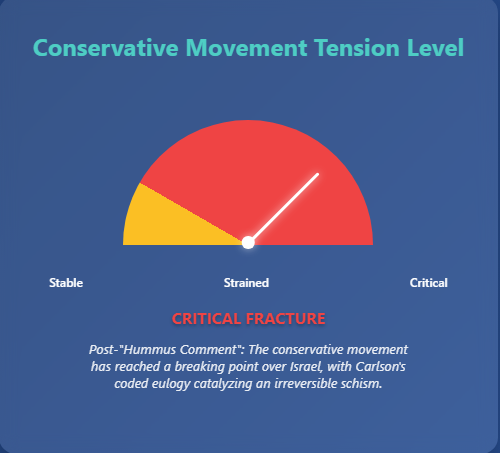
Carlson’s hummus parable was more than a rhetorical flourish; it was a moment that crystallized a generational and ideological split on the right. For decades, pro-Israel sentiment was one of the few areas of ironclad unity in the conservative movement. That consensus is now visibly collapsing, and Kirk’s assassination — and Carlson’s framing of it — have become flashpoints in that unraveling.
By choosing to invoke Jerusalem and hummus in his eulogy, Carlson placed Israel at the symbolic center of the story. He didn’t need to name it; the imagery was enough. In doing so, he gave shape to what many grassroots conservatives already suspected — that Israel is not beyond question, and may even be entangled in the darker narratives surrounding Kirk’s death. For hawkish donors and establishment Republicans, the fact that this message was delivered at Kirk’s memorial by one of the most influential conservative voices in America was a gut-punch.
The implications are twofold. First, Carlson has cemented himself as the standard-bearer for a wing of the right wing populist movement openly skeptical of Israel, no longer content to couch that skepticism in foreign-policy abstractions. Second, Kirk’s death is likely to be remembered not only as the silencing of a rising conservative star, but also as the moment when the American right’s long-standing consensus on Israel began to rupture in public.
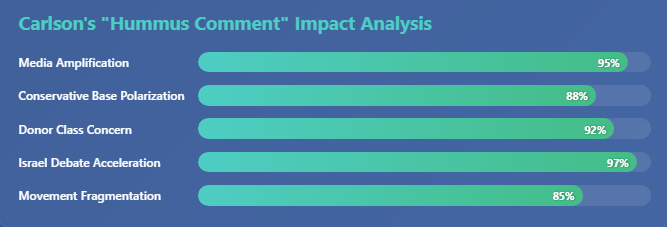
Tucker Carlson’s “hummus comment” at Charlie Kirk’s funeral will be remembered less as a biblical parable than as a political marker. By invoking Jerusalem and hummus in a story about powerful men conspiring to silence a truth-teller, Carlson placed Israel squarely in the interpretive frame of Kirk’s death without ever naming it. The plausible deniability was the point — enough imagery to spark immediate recognition, enough ambiguity to avoid outright accusation.
For a movement already fracturing over Israel, the remark was gasoline on an open fire. Kirk had been straining against the weight of Israel questions in his final months, trying to hold together a coalition that no longer agreed on what loyalty to Israel should mean. Carlson, long since broken from that consensus, used Kirk’s memorial to show how far the ground has shifted.
In that sense, the hummus comment was not just a dogwhistle — it was a declaration that the old order is gone. The American right is entering a new phase, one where support for Israel is contested rather than assumed, and where the deaths of its own leaders are woven into narratives of betrayal, foreign intrigue, and suppressed truth. Carlson ensured that Charlie Kirk’s legacy will be bound up with that schism.